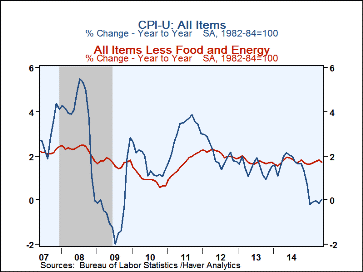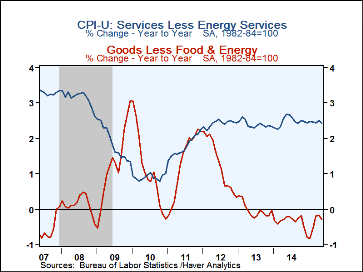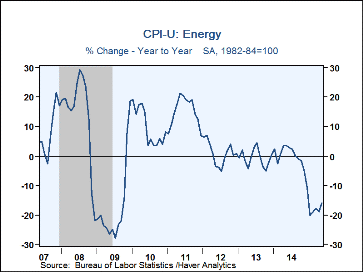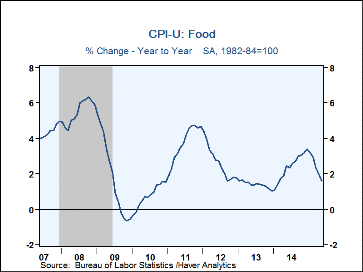 Global| Jun 18 2015
Global| Jun 18 2015U.S. CPI Strength Is Driven by Energy; Core Increase Moderates
by:Tom Moeller
|in:Economy in Brief
Summary
The consumer price index jumped 0.4% during May (-0.0% y/y) following an unrevised 0.1% increase. It was the strongest rise since January 2013. Expectations had been for a 0.5% increase in the Action Economics Forecast Survey. Prices [...]
The consumer price index jumped 0.4% during May (-0.0% y/y) following an unrevised 0.1% increase. It was the strongest rise since January 2013. Expectations had been for a 0.5% increase in the Action Economics Forecast Survey. Prices excluding food & energy notched 0.1% higher, the weakest increase since December. A 0.2% rise had been expected.
Higher energy prices provided strength to last month's overall CPI with a 4.3% jump, but they still were down 16.3% y/y. Gasoline prices surged 10.4% (-25.0% y/y) to the highest level since December. Fuel oil prices increased 0.7% (NSA, -27.6% y/y) but natural gas prices remained unchanged (-15.4% y/y). Household electricity prices fell 1.2% (+0.5% y/y). Holding steady were food prices (1.6% y/y) following declines during the prior two months. Poultry prices fell 1.5% (+0.1% y/y); meat prices declined 0.4% (+3.3% y/y) and cereal & bakery product costs eased 0.1% (+0.8% y/y). These declines were offset by a 2.6% rebound in egg prices (3.1% y/y), a 0.3% rise (-1.8% y/y) in fruit & vegetable prices and a 0.1% uptick (0.8% y/y) in bakery product costs.
Core service price inflation decelerated to 0.2% (2.4% y/y) after picking up to 0.3% in April. Public transportation prices jumped 3.4% (-4.1% y/y) and shelter costs rose 0.2% (2.9% y/y) after two months of 0.3% increase. Owners' equivalent rent of primary residences gained a firm 0.3% (2.8% y/y) for the third straight month. Tuition, other school fees and child care costs rose 0.3% (3.6% y/y) while recreation prices also improved 0.3% (1.9% y/y). Medical care costs rose 0.2% (2.5% y/y) following a 0.9% jump. These gains were offset by a 0.1% dip (+0.5% y/y) in education & communications services prices.
Goods prices other than food & energy eased 0.1% (-0.3% y/y), the first decline since January. Household furnishings & supplies prices declined 0.4% (-1.0% y/y) and reversed most of the prior month's increase. Apparel costs fell 0.5% (-1.5% y/y), down for a second straight month. Used vehicle prices softened 0.4% (-0.5% y/y) and recreation goods prices fell 0.2% (-3.0% y/y). These declines were offset by a 0.4% increase in medical care costs (3.9% y/y) and a 0.2% rise (0.8% y/y) in new vehicle prices. Educational books & supplies costs edged 0.1% higher (5.8% y/y).
The consumer price data is available in Haver's USECON database while detailed figures can be found in CPIDATA. The expectations figure is from Action Economics and is found in the AS1REPNA database.
| Consumer Price Index (%) | May | Apr | Mar | May Y/Y | 2014 | 2013 | 2012 |
|---|---|---|---|---|---|---|---|
| Total | 0.4 | 0.1 | 0.2 | -0.0 | 1.6 | 1.5 | 2.1 |
| Total less Food & Energy | 0.1 | 0.3 | 0.2 | 1.7 | 1.7 | 1.8 | 2.1 |
| Goods less Food & Energy | -0.1 | 0.1 | 0.3 | -0.3 | -0.3 | -0.0 | 1.3 |
| Services less Energy | 0.2 | 0.3 | 0.2 | 2.4 | 2.5 | 2.4 | 2.4 |
| Food | 0.0 | -0.0 | -0.2 | 1.6 | 2.4 | 1.4 | 2.6 |
| Energy | 4.3 | -1.3 | 1.1 | -16.3 | -0.3 | -0.7 | 0.9 |
Tom Moeller
AuthorMore in Author Profile »Prior to joining Haver Analytics in 2000, Mr. Moeller worked as the Economist at Chancellor Capital Management from 1985 to 1999. There, he developed comprehensive economic forecasts and interpreted economic data for equity and fixed income portfolio managers. Also at Chancellor, Mr. Moeller worked as an equity analyst and was responsible for researching and rating companies in the economically sensitive automobile and housing industries for investment in Chancellor’s equity portfolio. Prior to joining Chancellor, Mr. Moeller was an Economist at Citibank from 1979 to 1984. He also analyzed pricing behavior in the metals industry for the Council on Wage and Price Stability in Washington, D.C. In 1999, Mr. Moeller received the award for most accurate forecast from the Forecasters' Club of New York. From 1990 to 1992 he was President of the New York Association for Business Economists. Mr. Moeller earned an M.B.A. in Finance from Fordham University, where he graduated in 1987. He holds a Bachelor of Arts in Economics from George Washington University.










